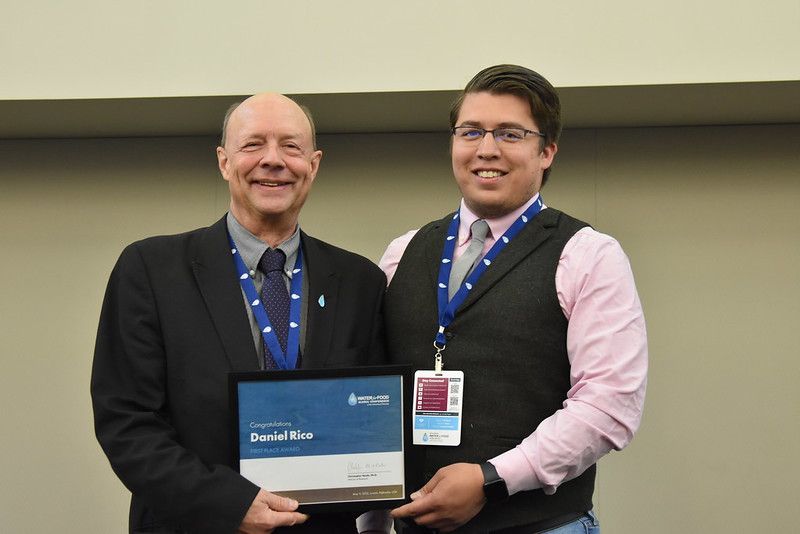Aug 30, 2023
By Victoria Grdina

School of Computing graduate research assistant Daniel Rico was the first-place winner of the DWFI-supported student poster competition at the 2023 Water for Food Global Conference.
The Water for Food Global Conference brings together experts from around the world to discuss advances in science, technology and policy to help address one of the most urgent challenges of the 21st century: how to achieve greater food security with less pressure on scarce water resources. This year’s conference took place May 8-11 at Nebraska Innovation Campus.
Rico’s project, “Tracking of the Tethered Aircraft Unmanned System to Derive Atmospheric Wind and Gaseous Carbon Transport,” aimed to better understand how gases like carbon dioxide and methane, which play a role in human-influenced climate change, move through the Earth's atmosphere above agricultural regions, particularly near the ground through the wind. Wind distribution of these gases may impact evapotranspiration (ET) calculations, which farmers use to make irrigation decisions, and atmospheric scientists use to predict severe weather events. For his research, Rico modified his tethered aircraft unmanned system called TAUS by adding sensors that measure both inertial and gas levels to simultaneously track the sensor's location and their acquisitioned gas data. By comparing these measurements with data from well-maintained Eddy Covariance towers, Rico's research seeks to enhance our understanding of gaseous carbon movement, improve our understanding of climate change, and assist farmer decision-making.
Daniel has a B.S. in Electrical Engineering, an M.S. in Computer Engineering, and is currently a third-year Computer Science Ph.D. student in the School of Computing advised by Dr. Justin M. Bradley, Dr. Carrick J. Detweiler of the School of Computing, and Dr. Francisco Munoz-Arriola of the School of Natural Resources as a member of the Nebraska Intelligent MoBile Unmanned Systems (NIMBUS) Lab, and the Climate Analytics, Analysis, and Synthesis for Action (CAASA) Research Collective. He has submitted a paper focusing on the inertial localization of the sensors placed along the TAUS to the International Symposium on Experimental Robotics (ISER) 2023 to be held in Thailand from November 26-30, 2023, if accepted. His work is directly related to a new U.S. Department of Agriculture’s (USDA) National Institute of Food and Agriculture grant, focused on unlocking the potential of carbon sequestration, an approach to fighting climate change that compensates farmers for leaving land untilled. As part of a multifaceted team, they will work to quantify how much carbon is actually stored in the soil. they will use the TAUS, with its sensors placed along the tether, to measure the volume of air over the field, including measurements of temperature, carbon dioxide, wind, and other atmospheric traits. The team will then develop a smart sampling strategy that pinpoints the locations that will yield the data most critical to monitoring, reporting, and verification (MRV), which is key to scaling up the process and minimizing unnecessary work. These algorithms will then be incorporated into a widely used USDA software tool.